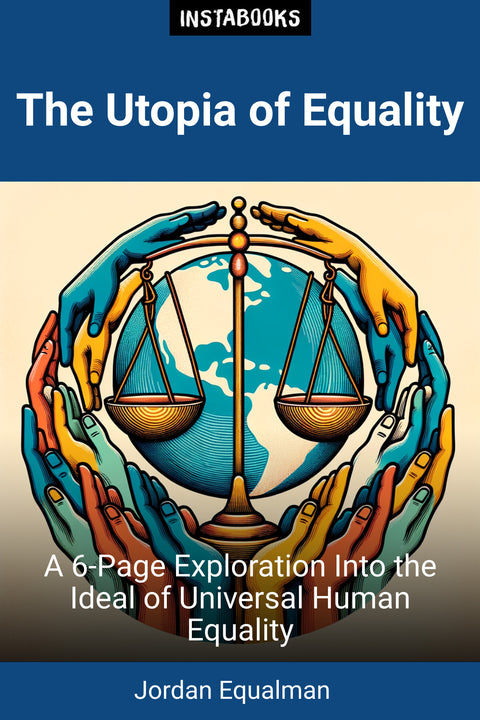
The Utopia of Equality
A 6-Page Exploration Into the Ideal of Universal Human Equality
Included:
✓ 200+ Page AI-Generated Book
✓ ePub eBook File — read on Kindle & Apple Books
✓ PDF Print File (Easy Printing)
✓ Word DOCX File (Easy Editing)
✓ Hi-Res Print-Ready Book Cover (No Logo Watermark)
✓ Full Commercial Use Rights — keep 100% of royalties
✓ Publish under your own Author Name
✓ Sell on Amazon KDP, IngramSpark, Lulu, Blurb & Gumroad to millions of readers worldwide
A Concise Overview of Universal Human Equality as a Utopia
The concept of universal human equality as a utopia is an enduring and complex ideal that has evolved over centuries. This brief overview explores the historical contexts, key milestones, and contemporary debates surrounding this ideal, offering a comprehensive yet concise perspective.
Historical Contexts
- Thomas More's 'Utopia': Published in 1516, Thomas More's 'Utopia' is one of the earliest works to conceptualize a society where all citizens are equal. This foundational text laid the groundwork for future utopian ideals, emphasizing the importance of social welfare and equality.
- Post-World War II Human Rights: The Universal Declaration of Human Rights (UDHR) in 1948 marked a significant milestone in the pursuit of universal equality. The UDHR enshrined fundamental human rights such as life, liberty, and equality before the law, setting a global standard for human dignity.
Evolution of Human Rights
- From Ideal to Reality: The UDHR was a visionary document ahead of its time; however, its implementation has been fraught with challenges. The document's emphasis on economic, social, and cultural rights has often been overlooked in favor of individual civil and political rights.
- Critiques and Revisions: Samuel Moyn's work critiques the notion that human rights were always a central concern. He argues that human rights became prominent only after the failures of other utopian dreams, such as communism and nationalism.
Contemporary Debates
- Global Welfare States: The concept of universal human equality is often linked to the idea of global welfare states. The reality of economic inequality and the dominance of national citizenship over global citizenship pose significant challenges to achieving true equality.
- National Citizenship vs. Global Citizenship: The tension between national sovereignty and global human rights remains a contentious issue.
Challenges and Progress
- Inequality and Injustice: Despite progress, significant inequalities persist. Issues like economic inequality, racial disparities, and gender discrimination continue to hinder the realization of universal human equality.
- Reinventing Human Rights: Recent crises highlight the need to reinvent human rights work through feminist, decolonial, and ecological interventions.
Conclusion
Achieving universal human equality remains an idealistic vision facing numerous challenges. By understanding historical contexts, critiquing existing frameworks, and engaging in contemporary debates, striving towards a more equitable world continues. This overview underscores the ongoing need for reinvention in pursuing true equality.
Table of Contents
1. Introduction to Utopian Equality- The Idealistic Vision
- Historical Inspirations
- Modern Interpretations
2. Thomas More's Foundational Work
- Conceptualizing Utopia
- Equality in 1516
- Lasting Impacts
3. Post-War Human Rights Revolution
- The UDHR Milestone
- Rights for All
- Challenges and Gaps
4. From Ideal to Implementation
- Reality Check
- Economic vs Civil Rights
- Political Dynamics
5. Critiques and Analyses
- Samuel Moyn's Perspectives
- Utopian Failures
- Activism's Role
6. The Global Welfare States Debate
- Vision vs Reality
- Economic Inequality
- Citizenship Challenges
7. National vs Global Citizenship
- Sovereignty Conflicts
- Human Rights Tensions
- Balancing Acts
8. Inequality and Injustice
- Persistent Issues
- Social Disparities
- Gender Matters
9. Reinventing Human Rights
- New Crises, New Approaches
- Feminist Interventions
- Decolonial Perspectives
10. Ecological and Ethical Insights
- Environmental Challenges
- Ethical Dimensions
- Global Responsibility
11. Strategies for True Equality
- Practical Steps
- Collaborative Efforts
- Future Directions
12. Conclusion and Reflections
- Summarizing Insights
- Reflecting on Progress
- Continuing the Journey
Target Audience
This book is tailored for readers interested in a succinct exploration of human equality through historical, contemporary, and critical lenses.
Key Takeaways
- Understand the historical evolution of the concept of universal human equality.
- Explore the impact of major milestones like the Universal Declaration of Human Rights.
- Critically analyze perspectives from influential thinkers such as Samuel Moyn.
- Discover contemporary challenges in achieving equality, including economic and national obstacles.
- Gain insights into the necessity for evolving human rights approaches.
